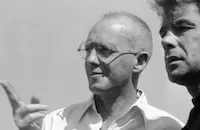My Bill

Brief Synopsis
Cast & Crew
John Farrow
Kay Francis
Bonita Granville
John Litel
Anita Louise
Bobby Jordan
Film Details
Technical Specs

Synopsis
Widow Mary Colbrook is rearing her four children, Gwen, Muriel, Reginald and the youngest, Bill, on her own. Because of bad investments, the family has run out of money, to the embarrassment of the three older children. In Bill's eyes, however, Mary can do no wrong. After the piano is repossessed, Mary visits banker John Rudlin, an old friend and he gives her the money to pay her debts. While playing football, Bill meets the widowed Mrs. Adelaide Crosby. When she has a heart attack during a quarrel, Bill gets her medicine and helps her to a chair. Afterward, the old woman and the young boy become friends. Aunt Caroline, their father's sister, deeply disapproves of Mary, suspecting falsely that Bill is not her brother's son. She invites the three oldest, the ones she calls "true Colbrooks," to live with her, and over Mary's protests, they agree. Only Bill remains with his mother. In order to earn some money to help Mary, Bill borrows three dollars from Rudlin to open a newsstand. Meanwhile, Caroline is very strict with the children. She refuses to let Muriel associate with her fiancé, Lynn Willard, because he does not come from an upper class family, and also orders them to stay away from Bill and their mother. Then Caroline takes the lease on their old house and evicts Bill and Mary. When Mary is unable to find a job, she plans to move to New York. Bill visits Mrs. Crosby to say goodbye and discovers that she has been sick. He brings Mary to care for Mrs. Crosby, who invites them to live with her. After Mrs. Crosby dies, she leaves everything, including the house she lives in and the house Caroline rents, to Bill. The other children finally realize they have been unfair to their mother and write her a letter of apology on Mother's Day. She gladly takes them back and when Caroline returns from a trip, she finds the family reunited in their old home. Rudlin, who is visiting, explains to the children that their father made Mary's life miserable after he discovered that Rudlin and Mary had been in love when they were young. Mary adds that she had married for money but now is planning to rectify her mistake by marrying Rudlin, whom she still loves.

Director

John Farrow
Cast

Kay Francis

Bonita Granville

John Litel

Anita Louise

Bobby Jordan

Dickie Moore
Maurice Murphy

Elisabeth Risdon
Helena Phillips Evans

John Ridgely
Sidney Bracy
Bernice Pilot
Jan Holm
Crew
George Bilson
George Bilson
Leo F. Forbstein
Bryan Foy
Milton Gropper
Sid Hickox
Lee Katz
Charles Lang
Frank Magee
Orry-kelly
Max Parker
Jack Saper
Russ Saunders
Vincent Sherman
Vincent Sherman
Jack L. Warner
Robertson White

Film Details
Technical Specs

Articles
My Bill
From the early to mid 1930s Kay Francis was one of Warner Bros.' most popular and highest paid stars. When she made My Bill, however, Francis' career was on the decline and she was growing increasingly unhappy with her diminishing importance at the studio. My Bill, though a solid starring role, was indicative of the second string projects to which she was now being assigned. Even young child star Dickie Moore observed Francis' unhappiness about the film at the time. "[She] was pleasant," said Moore in his 1984 autobiography Twinkle, Twinkle, Little Star (But Don't Have Sex or Take the Car), "but she worried that her role was not sufficiently important."
According to one of the film's writers, Vincent Sherman, the script for My Bill was a rush job that reflected the lack of care Warner Bros. was now taking with its former queen of the lot. "[Producer Bryan Foy] had assigned another writer to work on the script but asked me to take over, and he informed me that the film had to start the next week," recalled Sherman according to the 2005 biography Kay Francis: A Passionate Life and Career. "Thus, he needed a script by Monday morning. It was now Thursday afternoon."
Despite the hurried nature of My Bill's production, especially strong performances from Francis and Dickie Moore boosted the material, and the film received unexpected critical acclaim. Moore showed off his remarkable natural talent in a sensitive role, while Francis proved that she could pull off a homespun matriarch character under the direction of John Farrow (Mia's father) without the glamour that often accompanied her earlier films.
Based on a 1928 play by Tom Barry, My Bill was a remake of an earlier Warner Bros. film in 1930 called Courage starring Belle Bennett in the Kay Francis role and Leon Janney as Bill.
Director: John Farrow
Screenplay: Vincent Sherman, Robertson White (screenplay); Tom Barry (play); George Bilson (contributing writer and to screenplay construction, uncredited); Milton Herbert Gropper (contributor to screenplay construction, uncredited); Lee Katz (contributor to treatment, uncredited)
Cinematography: Sid Hickox
Art Direction: Max Parker
Music: Howard Jackson (uncredited)
Film Editing: Frank Magee
Cast: Kay Francis (Mary 'Sweetheart' Colbrook), Bonita Granville (Gwendolyn 'Gwen' Colbrook), John Litel (John C. Rudlin, Bank President), Anita Louise (Muriel Colbrook), Bobby Jordan (Reginald 'Reggie' Colbrook, Jr.), Dickie Moore (William 'Bill' Colbrook), Maurice Murphy (Lynn Willard, Muriel's Fiancé), Elisabeth Risdon (Aunt Caroline Colbrook), Helena Phillips Evans (Mrs. Adelaide 'Duchess' Crosby), John Ridgely (Mr. Martin the Florist).
BW-65m. Closed Captioning.
by Andrea Passafiume

My Bill
Quotes
Trivia
The play opened in New York City, New York on 8 October 1928 and ran for 280 performances.
Notes
The pre-release title was In Every Woman's Life. This film was a remake of Warner Bros.' 1930 film Courage, which was directed by Archie Mayo and starred Belle Bennett (see AFI Catalog of Feature Films, 1921-30; F2.1035).















